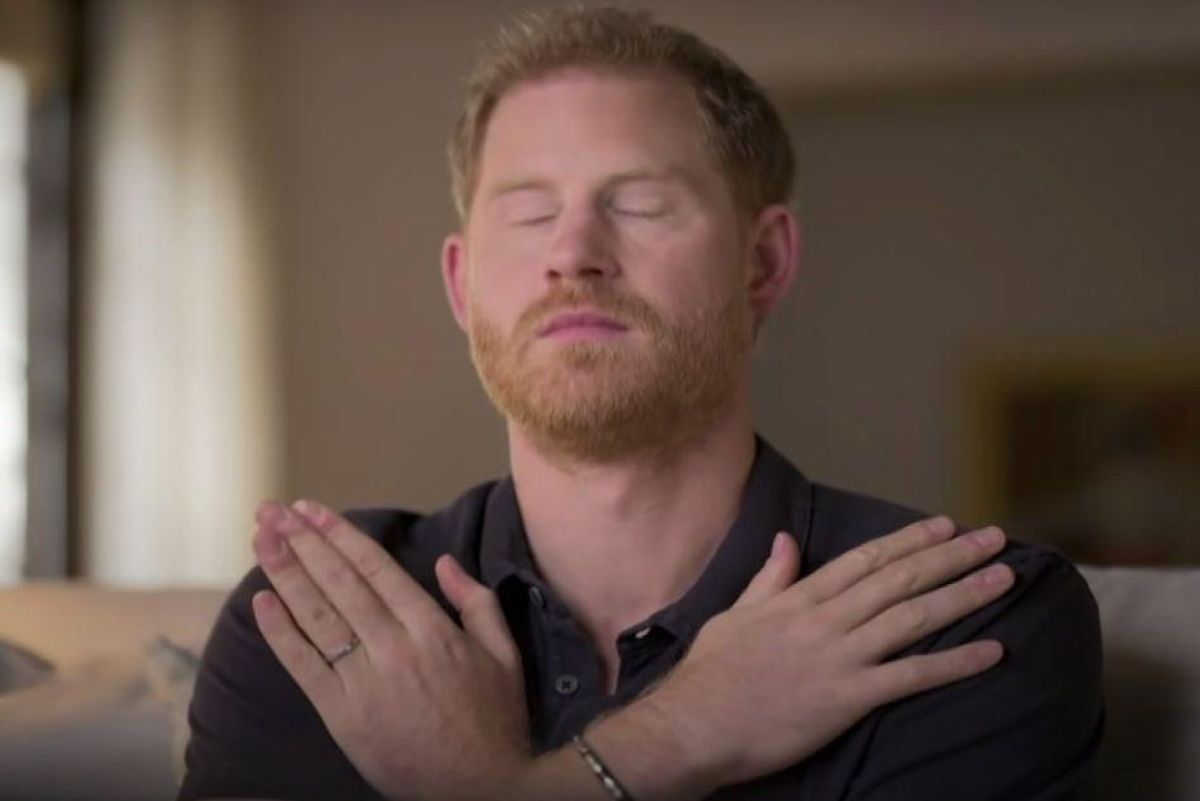Prince Harry shares how he uses EMDR therapy for trauma. What is it and how does it work?

Prince Harry has been refreshingly open about his mental health struggles for years, but in his new Apple TV docuseries on mental health, he's bringing the public into a therapy session with him.
Harry, has spoken about the trauma of losing his mother when he was 12 and how therapy has helped him. In his new series, he shares the role that one form of therapy—EMDR—has played in dealing with past trauma.
EMDR stands for Eye Movement Desensitization and Reprocessing and is a therapy that was developed in the 1980s. Dr. Francine Shapiro was walking through a park one day when she noticed that her eye movement seemed to ease her negative emotional responses to distressing memories. Over several years, she studied and tested that theory and discovered that others experienced the same kind of desensitizing with rapid eye movement. She added a cognitive component to process traumatic memories, and EMDR therapy was born.
Practitioners don't just utilize eye movement, but also sounds or taps or movements that alternately stimulate both sides of the body. In the preview for the show, we see Prince Harry crossing his arms and tapping his shoulders. He says he uses the therapy when he flies into London, which he says reminds him of the loss of his mother.
"One of the biggest lessons that I've ever learned in life is you've sometimes got to go back and to deal with really uncomfortable situations and be able to process it in order to be able to heal," he said in the show.
EMDR is designed to facilitate that processing. Good Morning America shared a segment on Harry's use of the therapy.
Prince Harry opens up about EMDR therapy in new show l GMAwww.youtube.com
The first time my own daughter was treated with EMDR, I was skeptical. She was seeing a therapist for emetophobia—a debilitating fear of vomiting—and EMDR was used to address traumatic memories she had of throwing up. I had heard of the treatment but had no idea what to expect.
"It's a way of helping the brain recategorize the memory," the therapist explained. "Imagine the brain is a hard drive, and you a memory that is filed under 'trauma.' Whenever you access that memory, feelings of trauma come up. With EMDR, we basically pull the memory from the trauma file, process it, and refile it into a different emotional category."
"It's almost like a therapy shortcut," she said. "We can do essentially the same thing with talk therapy, but it takes a lot longer."
The therapist then handed my daughter two paddles, one for each hand, connected by wires to a device. She asked her to visualize the memory she wanted to address, and while they talked it through, the paddles would alternately vibrate in her hands, right then left, right then left. It seemed odd, but research so far backs up its effectiveness. I've since met several people who credit EMDR with huge leaps in dealing with their trauma and its popularity seems to be increasing.
"It's almost a wave that can't be stopped because people are hearing their friends talk about it, they're seeing the changes in their family members," Wendy Byrd, a professional counselor and president of the board of directors at the EMDR International Association, told USA Today. "When I was trained in 2008, I would have to go in and explain what EMDR was and tell my clients why I thought it was such a good therapy. ... Now, I would say almost everyone that comes into my door is asking me for EMDR."
In the series, Harry talks to Oprah about the stigma surrounding mental health issues and the importance of seeking help when we need it.
"To make that decision to receive help is not a sign of weakness," Harry says. "In today's world, more than ever, it is a sign of strength."
The Me You Can't See — Official Trailer | Apple TV+www.youtube.com
If you have traumatic experiences that you want help with, a therapist trained in EMDR might be able to help. Check out the EMDR International Association's search tool to find an EMDR trained therapist in your area.
- Dwayne 'The Rock' Johnson body-slams mental health stigma in a ... ›
- Prince Harry opens up about mental health struggles and how he ... ›
- Woman shares her therapist's surprisingly helpful mental health tip ... ›
- People are sharing one thing they learned from therapy ›
- Emetophobia is easily mistaken for generalized anxiety or anorexia - Upworthy ›
- What is the 'dandelion vs orchid child' theory? - Upworthy ›
- Woman publicly embarrasses herself 30 days straight to overcome fear of rejection - Upworthy ›





 Rihanna Nails GIF
Rihanna Nails GIF

 Good luck trying to catch a gazelle.
Good luck trying to catch a gazelle. Chickens will eat just about anything.
Chickens will eat just about anything. There's actually a big difference between horses and zebras besides just the stripes.
There's actually a big difference between horses and zebras besides just the stripes. Stop Right There The End GIF by Freeform
Stop Right There The End GIF by Freeform